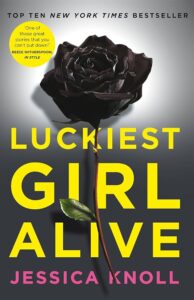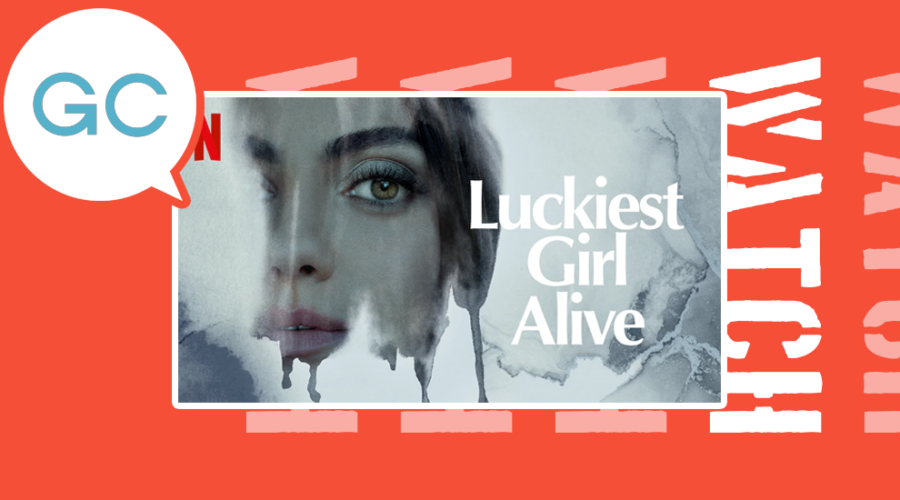This month over at Five Books For we’ve been looking at clever thrillers – the kind of thriller that not only keeps you compulsively turning the pages but has characters you care for, brilliant plotting and something to get you thinking. Luckiest Girl Alive by Jessica Knoll fits the bill perfectly. It’s taut and suspenseful with a complex heroine and a thoughtful exploration on the themes Knoll has chosen to interrogate.
 So what’s it about? Ani has a life many people would envy: a glamorous, high-profile New York City job, a wealthy and sophisticated fiancé and all the social cachet that goes with both those things.
So what’s it about? Ani has a life many people would envy: a glamorous, high-profile New York City job, a wealthy and sophisticated fiancé and all the social cachet that goes with both those things.
However, in Ani’s past lies a dark secret, linked to the school shooting that took place at her private prep school while she was a student there.
When Ani agrees to take part in a documentary about the shooting, she has every intention of demonstrating how far she’s moved on since high school, and how successful she’s become, but it looks as though the dark undercurrents she fought so hard to rise above are welling up again.
Spoilers follow so if you prefer to start reading with no idea of the plot, skip the next few paragraphs! I won’t give away the main twists or ending though, so even if you read on there will still be plenty of suspense in the story for you.
Luckiest Girl Alive is a great read. Ani is a complex character, not always easy, but Knoll makes her sympathetic without needing her to be perfect, which can be a fine line to tread.
The plotting is first-rate: the book is told in two timelines, one back in Ani’s schooldays, and the second in her life as an adult.
In the school-era timeline we see Ani (then known as TiffAni) starring afresh at a private school after being kicked out of her old school for smoking cannabis. The refusal to set her up as a good girl/perfect victim is one of the main strengths of the book: Knoll doesn’t shy away from complexity. Ani’s relationship with her (awful) mother is shown throughout both timelines but it’s the school timeline that has all the raw trauma.
When Ani, desperate to fit in, is invited to a party by Dean, one of the popular boys, she is delighted even as we flinch at her naivete and wish we could stop her from going. At the party Dean and two of his friends rape her after plying her with alcohol. In the aftermath, she has no support other than from one teacher, and even he is limited in terms of what he can do for fear of being accused of having an inappropriate relationship with her.
When she confides in Arthur, a nerdy kid who has also been bullied by Dean, and one of Ani’s only friends at school, he confides in turn that another friend of his ended up attempting suicide because of the bullying he also experienced at their hands. Arthur and his friend decide to take their own revenge and are the perpetrators of the school shooting, in which Dean sustains a permanently disabling wound and her other rapists are murdered.
Ani has to make a choice during the shooting that will come back to haunt her and this forms a big part of the suspense of the novel.
The events of the party and the school shooting that takes place afterwards end up being the engine of Ani’s life, and while her success is her armour, it’s also a toxic coping mechanism that isn’t doing her any favours as an adult, despite how things may look from the outside. We see the adult Ani start to question whether the life that she’s built is truly going to make her happy, with the documentary-making providing the impetus for the conflict of the modern-day timeline. Dean, now a politician, is also participating in the documentary, although his side of the story is that Ani took an active role in the shooting and has never been punished for it.
The novel provides a smart interrogation of sexual assault, bullying, trauma’s long-reaching effects, the insulating properties of class and wealth and the power of speaking up. The way that Ani copes may not be typical but it is adaptive and it makes her a compelling character, especially when things start to fall apart and she has to question whether her coping mechanism has truly worked for her.
Knoll uses the disparity to great effect to explore not only her chosen themes but also questions of revenge: is living best really the best revenge, or even enough? Is it enough that you know the truth, even if others have a different story?
The book was adapted for Netflix in 2022, with Knoll at the helm of the screenplay, and while the movie isn’t quite as good as the book, it’s very watchable.
The main issue with it is that it distils down some of the thoughtfulness and complexity of the book into easier, more digestible fodder. It’s a shame because while the endings aren’t vastly different, the ending of the book is far superior to the film, which is more feel-good and less complex.
However, Mila Kunis is exceptional in the lead role and the contrast between the facade that she presents to others and her inner monologue is one of the strengths of the film and really brings to life one of the themes of the book.
The film also looks beautiful: the New York setting, the colours and the design are all beautifully and thoughtfully presented. If you’re in the market for a topical thriller then it’s a perfect weekend movie night choice although, to my mind, this is one of those occasions where it’s better to read the book before watching the film.
If you choose just one format, the book is definitely the better option but the film is worth watching for Kunis’ performance.
Have you read or seen Luckiest Girl Alive? I’d love to hear what you thought – you can let us know via our social media channels.

